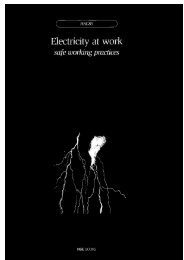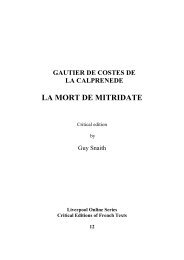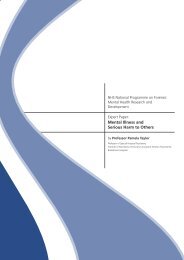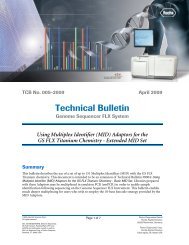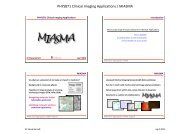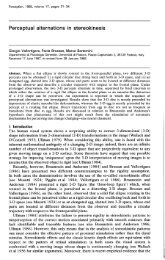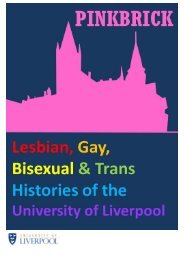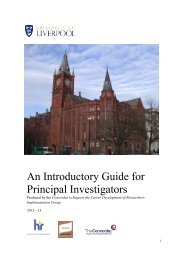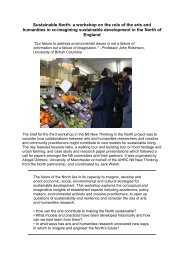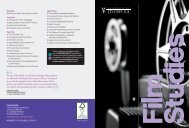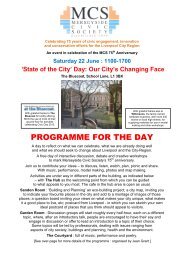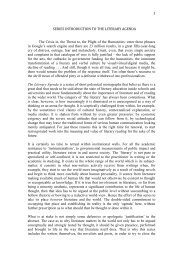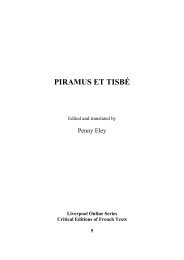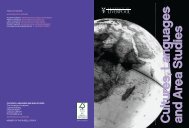Mental Well-being Impact Assessment of Projects funded
Mental Well-being Impact Assessment of Projects funded
Mental Well-being Impact Assessment of Projects funded
You also want an ePaper? Increase the reach of your titles
YUMPU automatically turns print PDFs into web optimized ePapers that Google loves.
AsylumLink Merseyside: ‘Better Lives’ project<br />
Summary<br />
The stakeholders identified some key determinants <strong>of</strong> mental well-<strong>being</strong> that were both <strong>of</strong> high importance<br />
and had a high impact.<br />
MWIA Area Increasing Control Resilience Participation Inclusion<br />
Skills and Attributes Emotional <strong>Well</strong>- Sense <strong>of</strong> belonging Trust others<br />
Key<br />
<strong>being</strong><br />
Determinants Opportunities to Trust and Safety Feeling involved Accept and be<br />
influence decisions<br />
accepted<br />
Sense <strong>of</strong> control Social Networks Opportunities to Practical support to<br />
over work<br />
bring people<br />
together<br />
enable inclusion<br />
A focus on these for Asylum Link Merseyside’s ‘Better Lives’ project will help promote the mental well-<strong>being</strong> <strong>of</strong><br />
the participants in the project and users <strong>of</strong> the centre.<br />
7. REVIEWING THE LITERATURE EVIDENCE BASE<br />
The MWIA toolkit assessment criteria for the protective factors (discussed in section 6) are based on a review<br />
<strong>of</strong> the published literature that research suggests are helpful in promoting and protecting mental well-<strong>being</strong>.<br />
In order to build on this evidence base a short additional literature review was undertaken to identify<br />
published research studies relating to the potential effects <strong>of</strong> ALM on mental well-<strong>being</strong>. This is intended to<br />
provide further evidence to substantiate or challenge the findings from the MWIA workshop.<br />
The literature review was complied by searching existing relevant published papers and articles relating to<br />
asylum seekers and the mental well-<strong>being</strong> or mental health status <strong>of</strong> the asylum seekers and refugees.<br />
Literature provided by the centre was also used including the yearly newsletter detailing recent events and<br />
changes as well as success stories, a LASAR/MRSN produced magazine in collaboration with Liverpool City<br />
Council, the European Union and Merseyside Refugee Support Network. A study into ALM was also conducted<br />
with the University <strong>of</strong> Central Lancashire and this has been used for the literature review.<br />
Project Background<br />
This project is unique in that its primary aim is to create a community for people who otherwise are likely to<br />
have extreme difficulty in becoming part <strong>of</strong> one. <strong>Projects</strong> such as this one can help foster a sense <strong>of</strong><br />
community that otherwise wouldn’t exist and make connections for people who live geographically close<br />
which may not have otherwise been made. Asylum seekers visit the project from the immediate areas <strong>of</strong><br />
Kensington, Granby, Toxteth, Wavertree, Bootle and Anfield. However, with Liverpool becoming one <strong>of</strong> only<br />
two centres for ‘in house’ asylum claims people can travel from Manchester as well as the other areas within<br />
the North West, and even further afield. Asylum seekers commonly come from over 10 (66 in total) countries<br />
around the world and this grouping together <strong>of</strong> cultures, languages, races and religions is far from ideal.<br />
However, in the experience <strong>of</strong> ALM there is usually no conflict or problems. Feeling useful, feeling close to<br />
other people and feeling interested in other people are key attributes that contribute to positive mental well-<br />
<strong>being</strong> (Parkinson 2006) and this is something that is a core aim for ALM.<br />
Physical Health<br />
There is limited research in the UK about the health problems <strong>of</strong> asylum seekers and how their health is<br />
affected by immigration controls. A few studies completed suggest that 17% <strong>of</strong> asylum seekers have a physical<br />
health problem severe enough to affect their life and that 66% have experienced significant anxiety and/or<br />
41



